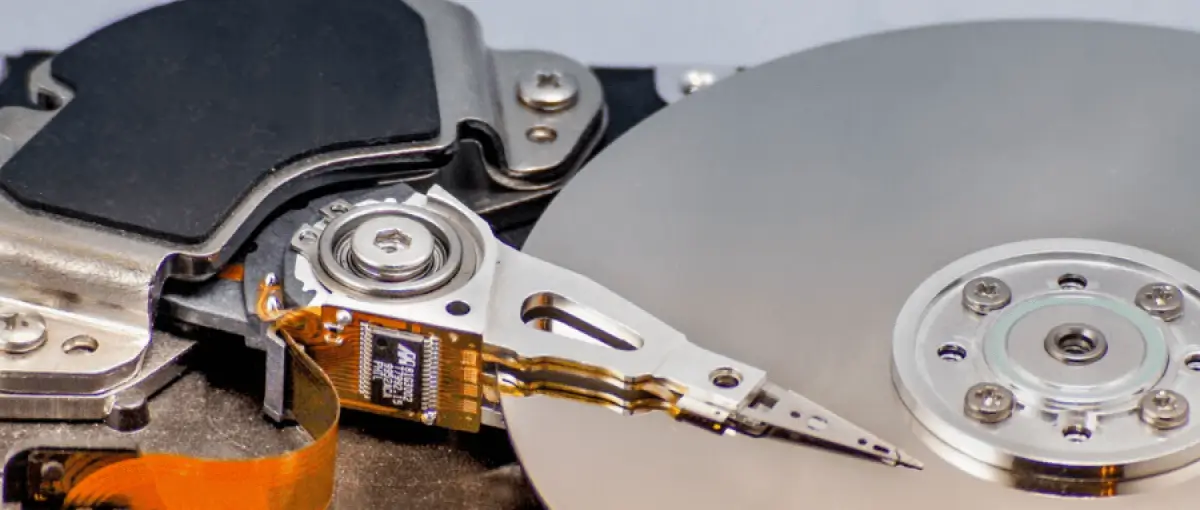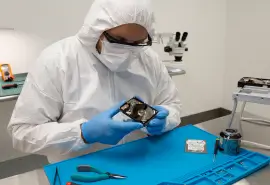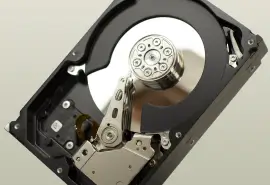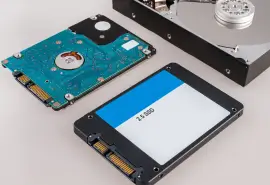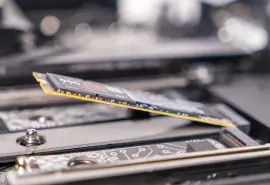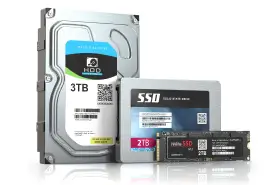Hard disk drives (HDDs) have been a storage device inside servers, PCs, and external enclosures for decades. Yet, many people do not know much about how hard drives work beyond their magnetic platters and moving parts.
HDDs use various recording technologies to maximize their performance and storage space. Conventional magnetic recording (CMR) and shingled magnetic recording (SMR) are two of the most popular examples. However, each method is better suited to specific workloads.
This guide explains the differences between CMR and SMR. Plus, it outlines what hard drives with CMR or SMR mean for casual users, professionals, and NAS builders.
Highlights:
- The decision often depends on how someone will use the hard drive.
- CMR is ideal for situations that require higher performance or sustained writes.
- SMR is an option for people who need greater capacities at a lower cost.
What Is CMR and SMR?
Conventional magnetic recording writes data in parallel tracks on the platter’s surface. CMR ensures that each track contains unique data. The straightforward approach rewards users with consistent speeds. It is also sometimes referred to as perpendicular magnetic recording (PMR).
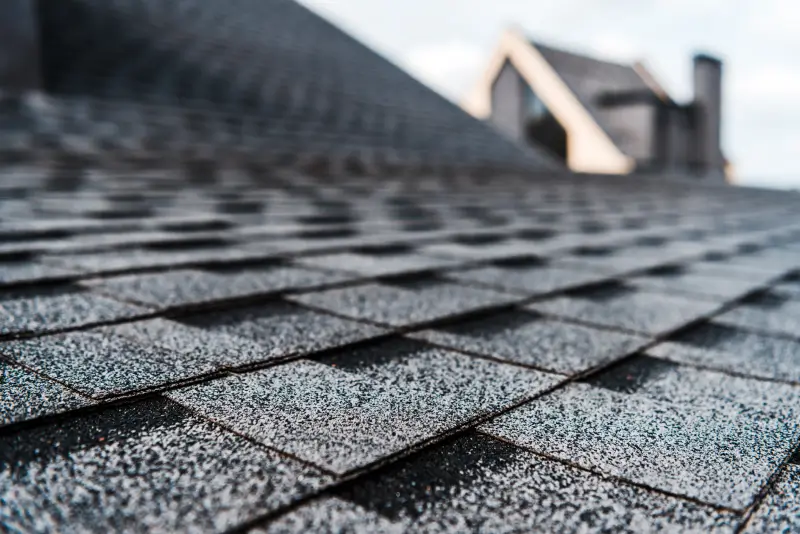
Shingled magnetic recording writes data in layered tracks on the disk. Tracks overlap with each other like shingles on the roof of a house. As a result, SMR packs more data onto the platter, but some bits encroach on neighboring tracks. This design complicates the write process.
The recording technology of a hard drive impacts its performance and reliability in certain conditions.
CMR vs. SMR: Key Differences
Here is a table to quickly compare CMR and SMR hard drives across multiple categories:
| CMR vs. SMR | ||
|---|---|---|
| Feature | CMR | SMR |
| Cost Per TB | Higher | Lower |
| Write Speeds | Faster | Slower |
| Read Speeds | Similar | Similar |
| Ideal Usage | Multi-Tasking | Archival |
| NAS Support | Full | Limited |
Write speeds are one of the biggest differences between CMR and SMR. As mentioned, the concentric tracks in a CMR hard drive leave space between adjacent regions. Read/write heads can locate and write data to any track without affecting another area. Therefore, the drive maintains consistent speeds while recording data.
On the other hand, SMR hard drives feature overlapping tracks. Layered tracks increase the disk’s capacity by improving the density of its platters. However, the structure causes slower read/write speeds because the drive cannot modify a single track. It must read, re-write, and then re-shingle the affected tracks. The process is even more time-consuming for tasks that need to access small pieces of data scattered across the platter.
Which Recording Technology Is Right for You?
The answer varies. A user facing sustained workloads will want a different drive than someone searching for cold storage.
Below, we recommend using CMR or SMR in several common scenarios.
Content Creator
Content creators often turn to a redundant array of independent disks (RAID) to improve performance and protect data. Combining multiple hard drives into a single logical unit requires a RAID controller to manage recording. CMR drives have optimized firmware and better write speeds than SMR disks. Their steady performance matters when working on intensive projects, such as rendering video files or processing raw photos. SMR drives stall during RAID rebuilds or under constant I/O (input/output) due to their inconsistent write behavior.
Verdict: CMR.
File Server or Home Lab
A file server in an office or home lab setup also benefits from using CMR drives. Both cases involve mixed workloads, from incremental updates to documents to frequent backups and file transfers. CMR handles each of these tasks smoothly, making it a smart choice for network storage and media servers. There is no need to plan around the slowdowns or quirks of SMR drives.
Verdict: CMR.
System Drive
CMR is the best option for those using a hard disk as their system drive. While CMR has higher write speeds than SMR in sequential benchmarks, the performance gap is even more pronounced for random workloads. Thus, a CMR drive is more responsive than an SMR device when faced with most system tasks. In addition, SMR drives can become sluggish over time as the disk fills up. The drop-off results from repeated re-writing of entire shingled zones on platters.
Verdict: CMR.
Bulk Storage
Some people keep an HDD to store more games, movies, TV shows, songs, or sizable datasets. A CMR drive is built to deliver the sequential write speeds needed for the regular transfer of large files. An SMR drive will struggle to maintain speeds as users add data to platters or remove files from the disk.
Verdict: CMR.
Local Backups
Choosing between CMR and SMR for local backups depends on usage patterns. People who schedule backups should opt for CMR models. CMR drives are much better for people with active routines because they can handle frequent changes without slowing down. Paying a slightly higher price per terabyte for proven performance could be worth it.
Verdict: CMR, if the budget allows for it.
Personal Archives
Unlike many backups, archives are considered cold storage. That means users rarely access data stored on the platters. SMR drives are a strong option for archives. A drive with SMR will not degrade if it writes once and reads rarely. They represent a less expensive solution for disks holding older records, projects, media files, or messages.
Verdict: SMR.
How To Tell if a Hard Drive is CMR or SMR
It is not always clear whether a hard drive uses CMR or SMR. Some companies do not disclose the recording method of their products. Other disks, such as the WD Blue series of desktop HDDs, offer both CMR and SMR drives.
These tips can help you figure out whether a hard drive uses CMR or SMR:
- Go to the brand’s website and check the drive’s spec sheet.
- Search third-party sources that list CMR and SMR models.
- Read trusted product reviews and testing.
If all else fails, SMR drives are most common between the 2 TB and 6 TB capacities. Although this approach is hardly foolproof.
Final Thoughts on CMR and SMR
Hard drives use different recording technologies to achieve separate goals.
CMR disks provide more consistent performance and higher write speeds than SMR drives. For that reason, CMR drives are an excellent choice in most cases.
In contrast, SMR drives have greater density than CMR models. The shingled design enables them to store the same amount of data on fewer platters. Hence, SMR drives are often a less expensive option for cold storage.
Your choice comes down to the cost or performance trade-offs you are most comfortable making.
Secure Data Recovery has supplied hard drive recovery since 2007. Our certified engineers have decades of experience and expertise across all disk, failure, and file types. Standard data recovery services include free quotes and a No Data, No Recovery Fee guarantee for complete peace of mind.

